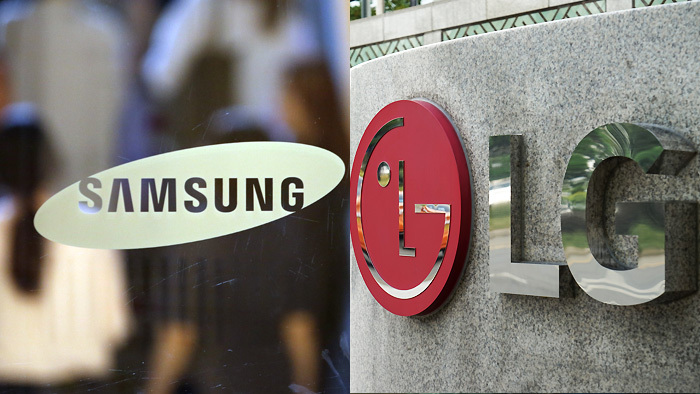Korean tech titans on Wednesday reported better-than-expected earnings results for the first three months of the year, with LG Electronics achieving the largest-ever first-quarter operating margin and Samsung Electronics posting 21.9 percent on-year rise in semiconductor sales.
But both expressed grave concerns about the upcoming quarters, anticipating sharper falls in sales as the COVID-19 pandemic continues.
According to its earnings announcement, LG Electronics obtained 1.09 trillion won ($895 million) in operating profit in the first quarter and a 7.4 percent operating profit rate, which was the highest rate for the first quarter ever. It is the second time for the first-quarter operating profit to exceed 1 trillion since 2018.
Sales came to 14.73 trillion won, which dipped 1.3 percent from last year.
By sector, the company’s home appliances division was the biggest performer, achieving the largest-ever first-quarter operating profit and business margin, despite negative consumer sentiment amid the pandemic.
Of the entire operating profit, the home appliance business accounted for over 75 percent, posting 753.5 billion won. The operating margin stood at 13.9 percent.
“As consumers show growing interest in health and hygiene, the sales of dryers, stylers and dishwashers increased in Korea, but overall sales declined due to lower sales overseas due to the COVID-19 impact,” the company said.
“Economic uncertainties are forecast to grow further in the second quarter, and the company is preparing against declines in sales and profitability,” an LG official said.
Samsung Electronics also said the company is bracing for greater adversity from the COVID-19 crisis, expecting sharper falls in sales of smartphones and home appliances.
In its first-quarter earnings announcement, the top tech giant posted 6.45 trillion won in operating profit, growing 3.43 percent from a year earlier.
The company’s sales stood at 55.33 trillion won, up 5.61 percent from the same period last year. But its net profit dropped 3.15 percent to 4.88 trillion won.
“Sales and profits of set products business, including smartphones and TVs, are expected to decline significantly as COVID-19 affects demand and leads to store and plant closures globally,” the company said.
“To address this, the company will leverage its global production flexibility and supply networks as well as strengthening its online sales capabilities.”
Even in the first quarter, Samsung already saw declines in the sales of smartphones and home appliances.
The consumer electronics division reported a 16.7 percent fall in operating profit due to dampened consumer sentiment amid the virus spread. Its sales stood at 10.3 trillion won, and operating profit at 450 billion won.
The division foresees additional decreases in TV sales in the second quarter, and is also adjusting plans to roll out new products, according to a company official.
The smartphone division’s sales declined 4.4 percent compared to last year, due to falls in phone sales. The unit raised 26 trillion won in sales and 2.65 trillion won in operating profit.
Samsung has predicted that uncertainties driven by COVID-19 will persist in the second half of the year as the duration and impact of the pandemic remain unknown.
“For the second half, while mobile demand will be most affected by COVID-19, it remains as one of the uncertainties,” a company official said. “A prolonged COVID-19 crisis will pose risks of reduction in overall demand.”
However, the company maintains its positive forecasts about the memory chip business.
“Overall memory conditions are likely to be favorable due to server and PC demand for a faster and more reliable cloud service experience.”
Samsung’s Device & Solutions division, which deals with semiconductors and is the most lucrative unit, raised 17.64 trillion won in sales in the first quarter, a 21.9 percent rise from last year and a 5.1 percent growth from the previous quarter, due to increased demand for memory chips for servers and PCs.
The division’s operating profit fell 3.2 percent to 3.99 trillion won on-year, but surged 15.7 percent from the fourth quarter.
Specifically, for DRAM, demand from data center companies remained solid, as usage of streaming services and online shopping rose, the company said. Demand for mobile DRAM fell due to COVID-19 and weak seasonality, but was offset by expanded demand for high-density products.
For PCs, DRAM demand also remained steady on the back of the increase in virtual meetings.
Samsung Display, the display unit of the semiconductor division, posted 6.59 trillion won in sales, up 7.7 percent from a year earlier, but swung to a 290 billion won deficit.
Samsung pledged to stick to its investment plan throughout the year, while closely managing risks brought by the COVID-19 impact.
In the first quarter, Samsung’s capital expenditure totaled 7.3 trillion won, including 6 trillion won spent on semiconductors and 800 billion won on displays.
By Song Su-hyun(
song@heraldcorp.com)





![[Herald Interview] 'Trump will use tariffs as first line of defense for American manufacturing'](http://res.heraldm.com/phpwas/restmb_idxmake.php?idx=644&simg=/content/image/2024/11/26/20241126050017_0.jpg)

![[Herald Review] 'Gangnam B-Side' combines social realism with masterful suspense, performance](http://res.heraldm.com/phpwas/restmb_idxmake.php?idx=644&simg=/content/image/2024/11/25/20241125050072_0.jpg)
![[Health and care] Getting cancer young: Why cancer isn’t just an older person’s battle](http://res.heraldm.com/phpwas/restmb_idxmake.php?idx=644&simg=/content/image/2024/11/26/20241126050043_0.jpg)